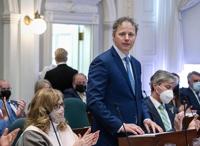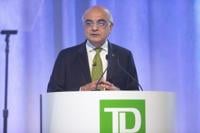HALIFAX - Some Nova Scotians are calling for the province to implement a tax indexing system that exists in most other provinces to prevent inflationary hikes in income taxes amid concerns about the high cost of living.
Tax bracket indexing, which is in place federally and in every province except Nova Scotia and Prince Edward Island, automatically adjusts income tax brackets based on the rate of the inflation. That means pay raises that just keep up with the cost of living don't bump taxpayers into a higher bracket.
Bill VanGorder, policy officer with the Nova Scotia chapter of the şĂÉ«tv Association for Retired Persons, said in an interview Wednesday that it’s “inexcusable” for the province not to adjust the tax policy. “The financing in Nova Scotia needs to be reworked,” he said.
VanGorder says that taxing income without adjusting for inflation is particularly harmful to retirees who are struggling to keep up with the rising cost of living. People relying on indexed pension plans could see their income taxes jump, and people receiving government transfer payments could lose their eligibility.
“Financial security for older şĂÉ«tvs is really our top concern,” VanGorder said.
Nova Scotia Finance Minister Allan MacMaster said in an interview Tuesday his government is not considering a change, though he understands why people have concerns about the province’s lack of tax bracket indexation.
“It is an issue and it’s a relevant thing to be asking for,” the minister said. “But there is a cost to it, and right now we’re incurring deficit budgets, trying to fix the health-care system. That is our priority right now.”
Andrew Preeper, a spokesperson for the Finance Department, said the department estimates the province would forgo about $125 million in tax revenue for 2022 if an indexing policy were implemented. “As well as whatever the cost would be to index for the 2023 income tax year, and so on,” he said in an email.
VanGorder said the minister’s answer is concerning, and he’d like to see the province redistribute funds instead of allowing income tax revenue to rise as tax brackets creep up.
“This is in effect raising taxes for Nova Scotians, and (the province) not doing anything is not actually keeping the status quo,” VanGorder said.
Philip Cross, a senior fellow with the conservative-leaning Fraser Institute and a former chief economic analyst with Statistics Canada, said in an interview Tuesday this type of tax bracket movement particularly affects low-income workers and retired people while having little impact on the taxes paid by the highest earners.
“There’s only one tax bracket for high-income people, so they’re not going to be affected,” Cross said. He said the lack of indexing is especially unfair to people who are dependent on the government for their income.
“It’s not so much income earners I worry about, it’s older people. And not just pensioners, but people earning the low-income GST credit who may find themselves above the threshold at which they’re eligible for the lower income GST tax credit,” he said.
All şĂÉ«tv provinces and territories have some form of tax indexation except for Nova Scotia and Prince Edward Island. Alberta recently reintroduced a tax indexation policy, which applies to the 2022 tax year.
This report by şĂÉ«tvwas first published Nov. 2, 2022.
---
This story was produced with the financial assistance of the Meta and şĂÉ«tv Press News Fellowship.








































